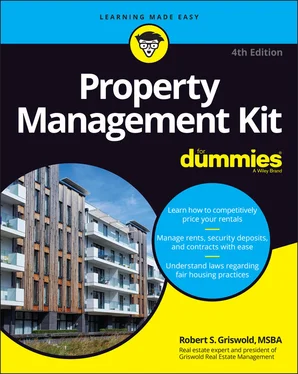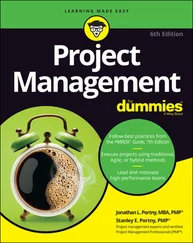Being aware of the tax consequences
As a rental property owner, you’re running a business and must file Schedule E with your federal tax return. The tax laws allow your rental housing business to deduct all operating expenses, including the costs of advertising, maintenance, payroll, insurance, property taxes, and management fees, whether those expenses are paid to yourself or a property management firm. Note: Federal and state tax codes change from year to year, so discuss your tax situation with your accountant or tax preparer in advance. The Internal Revenue Service (IRS) and state taxing authorities will also be expecting you to declare any income you may have paid yourself as a property manager.
Although your expenses are deductible, they erode the net income from your property. If your annual expenses are greater than your rent revenue, you may find that you can use those losses to ease the tax burden from your full-time job or other sources of income unrelated to your rental property. But a loss is a loss, and trying to keep your rental property in the black is still a good idea, even if you have to pay some taxes on the income.
The IRS’s passive-loss rule states that all real estate rental activities must be treated as passive, with an exception that some taxpayers are allowed up to a $25,000 annual deduction, with this deduction being phased out as the taxpayer’s reported income increases. There is also some limited ability to carry-back or carry-forward unused losses if the rental property owner meets certain criteria. A net operating loss (NOL) allows a rental owner to apply any unused NOL to a previous year’s tax return for an immediate refund of previous taxes paid. Although a tax-loss carry-forward applies a tax loss to future years’ tax returns, again it is subject to limitations or phasing out of the deduction based on the rental property owner’s overall reported income.
Real estate investors who can be classified as real estate professionals, however, are permitted to deduct all their rental real estate losses from their ordinary income, such as current employment income (wages and commissions), interest, short-term capital gains, and nonqualified dividends. See Chapter 20for more information on whether you meet the stringent IRS requirements to qualify as a real estate professional. If you do, you have a significant advantage that makes real estate investing more lucrative. Check out Real Estate Investing For Dummies, 4th Edition (John Wiley & Sons, Inc.), for the latest information on the tax advantages for real estate investors in the 2017 Tax Cuts and Jobs Act (TCJA).
 Even though federal real estate taxation laws consider most real estate activities to be passive rather than active investments, definite tax advantages exist for owners who are actively involved in the management of their rental properties. The definition of actively involved allows you to hire a property management firm and still take advantage of the tax write-offs available for rental income property as long as you’re involved in setting the rents and policies for the property. Be prepared to show the IRS or state income taxing authority written proof that you were involved with any such day-to-day decisions made in conjunction with your property manager.
Even though federal real estate taxation laws consider most real estate activities to be passive rather than active investments, definite tax advantages exist for owners who are actively involved in the management of their rental properties. The definition of actively involved allows you to hire a property management firm and still take advantage of the tax write-offs available for rental income property as long as you’re involved in setting the rents and policies for the property. Be prepared to show the IRS or state income taxing authority written proof that you were involved with any such day-to-day decisions made in conjunction with your property manager.
Chapter 4
IN THIS CHAPTER
 Getting copies of important documents before the deal is final
Getting copies of important documents before the deal is final
 Helping existing tenants through the transition process
Helping existing tenants through the transition process
Sometime during the process of thinking about investing in residential rental property, you may have considered acquiring a property already occupied by tenants. Or maybe you just found out that your dear old Aunt Beatrice left you an occupied rental property in her will. On the surface, these opportunities seem to be positive because you don’t have to advertise and select tenants yourself — at least not right off the bat. But just how positive an experience you have taking over an occupied rental property depends on the quality of your tenants. Some real estate investors prefer to acquire vacant properties so they can renovate and upgrade the rental property and select their own tenants.
This chapter focuses on some of the important issues involved in taking over rental property, whether you’re purchasing a property or you’ve inadvertently become the proud owner of one. Here, you find out how to begin the all-important task of implementing your own policies and procedures with the existing tenants, who may be living under an entirely different set of rules. The proper procedures for taking over a rental property actually begin before you’re legally the new owner. Ensuring that your transition goes smoothly requires some know-how, and in this chapter, I give you exactly that.
For more information on rental property acquisitions, proper due-diligence steps, property inspections, and renegotiating the deal or seeking credits in escrow, plus ideas on how to hold title to your rental properties, check out Real Estate Investing For Dummies, 4th Edition, by Eric Tyson and myself (John Wiley & Sons, Inc.).
Knowing What to Get Up Front
If you’re thinking about buying a residential rental property, you need to start by thoroughly investigating all aspects of it and its current tenants, if any. After all, no one is going to represent your interests as well as you.
The formal due-diligence period (between the acceptance of an offer and the close of escrow or completion of the sale, is the time to ask tough questions and make sure that you verify everything you have been told and are counting on getting in writing. ( Escrow is an account for funds and documents held by a neutral third party in a real estate transfer until all the conditions have been met, per the written instructions of the seller and buyer.) Don’t be shy. To be sure that you know what you’re getting, talk to the tenants; the neighbors; any homeowners’ association; local government agencies, including law enforcement and any rent-control board or similar organization; and the property’s contractors or suppliers. Search the web for public information such as code violations, police reports, and registered-sex-offender tenants. When you’re in this situation, remember my favorite motto: no surprises.
 Don’t underestimate the importance of this step. This review of the books and records, along with the physical inspection, reveals the actual operations of the property and allows you to determine whether the property is suitable, fairly priced, and meets your financial goals. When the property sale is complete, it’s too late to ask the seller to fix the leaky roof unless they engaged in an intentional effort to cover up the true condition of the property. Your remedies may come only in court, which can be costly and reserved only for the most serious or expensive issues.
Don’t underestimate the importance of this step. This review of the books and records, along with the physical inspection, reveals the actual operations of the property and allows you to determine whether the property is suitable, fairly priced, and meets your financial goals. When the property sale is complete, it’s too late to ask the seller to fix the leaky roof unless they engaged in an intentional effort to cover up the true condition of the property. Your remedies may come only in court, which can be costly and reserved only for the most serious or expensive issues.
Most sellers are honest and don’t intentionally withhold information or fail to disclose important facts. But the adage “Buyer beware” rings particularly true in the purchase of residential rental real estate. Resolving questions and issues now through regular communication with your seller eliminates some very unpleasant and possibly contentious disagreements with your tenants in the future.
Читать дальше

 Even though federal real estate taxation laws consider most real estate activities to be passive rather than active investments, definite tax advantages exist for owners who are actively involved in the management of their rental properties. The definition of actively involved allows you to hire a property management firm and still take advantage of the tax write-offs available for rental income property as long as you’re involved in setting the rents and policies for the property. Be prepared to show the IRS or state income taxing authority written proof that you were involved with any such day-to-day decisions made in conjunction with your property manager.
Even though federal real estate taxation laws consider most real estate activities to be passive rather than active investments, definite tax advantages exist for owners who are actively involved in the management of their rental properties. The definition of actively involved allows you to hire a property management firm and still take advantage of the tax write-offs available for rental income property as long as you’re involved in setting the rents and policies for the property. Be prepared to show the IRS or state income taxing authority written proof that you were involved with any such day-to-day decisions made in conjunction with your property manager. Getting copies of important documents before the deal is final
Getting copies of important documents before the deal is final Don’t underestimate the importance of this step. This review of the books and records, along with the physical inspection, reveals the actual operations of the property and allows you to determine whether the property is suitable, fairly priced, and meets your financial goals. When the property sale is complete, it’s too late to ask the seller to fix the leaky roof unless they engaged in an intentional effort to cover up the true condition of the property. Your remedies may come only in court, which can be costly and reserved only for the most serious or expensive issues.
Don’t underestimate the importance of this step. This review of the books and records, along with the physical inspection, reveals the actual operations of the property and allows you to determine whether the property is suitable, fairly priced, and meets your financial goals. When the property sale is complete, it’s too late to ask the seller to fix the leaky roof unless they engaged in an intentional effort to cover up the true condition of the property. Your remedies may come only in court, which can be costly and reserved only for the most serious or expensive issues.










